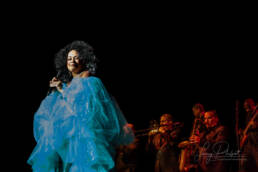Macy Gray: The Raspy Rebel Who Sang Her Truth
The Voice That Broke the Silence
In the gritty corners of Canton, Ohio, a young Natalie McIntyre hid behind a piano, her voice a secret weapon she barely knew she had. Music wasn’t a plan—it was a lifeline, a way to shake off the taunts of bullies who mocked her husky tone and awkward stride. Raised on Stevie Wonder and Billie Holiday, she stumbled into singing after a college fluke—standing in for a no-show vocalist at 19. “I just wanted to be me, loud and messy,” she’s said, and that raw need—to own her quirks, to turn pain into power—birthed Macy Gray, a soul siren who rasped her way from dive bars to global stages, redefining R&B with every gravelly note.

The Woman Behind the Rasp
Born September 6, 1967, Natalie Renee McIntyre grew up middle-class, daughter of a steelworker dad who split early and a math-teacher mom who remarried. Canton was tough—industrial, gray—but music was her color. Shy and stuttering, she found solace in records, dodging schoolyard jabs about her voice. At Mount Union College, studying film, she fell into jazz gigs, adopting “Macy Gray” from a neighbor’s mailbox—a name as quirky as her vibe.
Life’s been a wild ride. Married to Tracy Hinds from 1996 to 1998, she’s mom to three—Aanisah, Tahmel, and Happy—raising them through fame’s chaos. She’s battled bipolar disorder and drug binges, hitting rock bottom in the early 2000s, but clawed back with grit. Now 57, she’s single, splitting time between L.A. and Canton, her afro and raspy laugh still a middle finger to conformity.
The Career That Shook the Soul
Macy Gray’s career is a solo storm—no bands, just her name in neon. It started slow—gigging in L.A. dives, writing jingles—until Epic Records nabbed her in 1998. Her debut, On How Life Is (1999), exploded with “I Try,” a heartbreak anthem that stormed charts. She’s leaned on producers like Matt Ross-Spang and Dallas Austin, but her voice—gravelly, unmistakable—carries the load.
She’s collaborated with Fatboy Slim (“Demons”), Santana (“Amoré”), and Black Eyed Peas (pre-Fergie jams). No headline romances—her ex’s quiet exit left little gossip. Onscreen, she’s dazzled: Training Day (2001), Spider-Man (2002), and The Paperboy (2012), plus Fuller House and American Idol cameos. Awards? She snagged a 2001 Grammy for Best Female Pop Vocal (“I Try”), two MTV VMAs, and a 2000 Brit Award—殿all of Fame whispers linger. Her biggest hits?
- I Try (written by Gray, Jeremy Ruzumna, Jinsoo Lim, David Wilder) hit No. 5 on the Hot 100 in 1999, pure soul ache.
- Sweet Baby (Gray, Joe Solo) reached No. 23 in 2001, a tender groove.
- When I See You (Gray, Ruzumna, Victor Indrizzo) peaked at No. 19 in 2003, funky and fierce.
- Still (Gray, Ruzumna, Bill Esses) climbed to No. 18 in 2000, raw and real.
Controversy’s her shadow. In 2001, she stormed offstage mid-set in Portugal, jet-lagged and fed up—fans booed, papers pounced. Her 2000s drug spiral—cocaine, weed—hit headlines when she admitted collapsing on tour; rehab saved her. And a 2022 podcast rant calling for a new U.S. flag stirred outrage—she doubled down, “It’s just an idea, y’all.” Macy’s chaos is her canvas.
The Legacy of a Soul Survivor
Macy Gray’s tale is a raspy rise from Ohio shadows to global glow, her voice a jagged jewel in R&B’s crown. With over 7 million albums sold, she’s bridged soul, pop, and funk, a misfit who made it big. At 57, she’s no has-been—she’s a force, still touring, still rattling cages. Catch her live, and you’ll feel that college gig spark, now a smoky fire that burns bright and bold.








